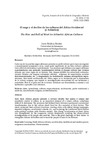Identificador persistente para citar o vincular este elemento:
https://accedacris.ulpgc.es/jspui/handle/10553/12814
| Campo DC | Valor | idioma |
|---|---|---|
| dc.contributor.author | Bolekia Boleká, Justo | en_US |
| dc.date.accessioned | 2015-02-14T03:30:36Z | - |
| dc.date.accessioned | 2018-03-15T14:28:53Z | - |
| dc.date.available | 2015-02-14T03:30:36Z | - |
| dc.date.available | 2018-03-15T14:28:53Z | - |
| dc.date.issued | 2014 | en_US |
| dc.identifier.issn | 1133-598X | en_US |
| dc.identifier.uri | https://accedacris.ulpgc.es/handle/10553/12814 | - |
| dc.description.abstract | Cada uno de los pueblos negro-africanos presenta un perfil cultural que le hace ser singular y esencialmente semejante a otros, como parte importante de un todo cultural, algunas veces difícil de determinar explícitamente. Los procesos que definían a los negro-africanos experimentaron una acelerada transformación debido al choque cultural que vivieron durante casi cinco siglos de su historia. Este choque debilitó sus estructuras culturales, creando Estados con lenguas extranjeras oficiales, religiones de importación, escuelas desvernacularizadas, etc., y desplazando los tradicionales sistemas sociopolíticos negro-africanos. Esta fuerte aculturación del África negra se ve fortalecida por la dominancia de la cultura exógena, que impide la reconfiguración etnocultural de sus habitantes y sociedades. Este es el gran reto de su futuro: fortalecer sus diversidades y enseñar a sus habitantes a aprender a ser africanos. | en_US |
| dc.description.abstract | Each black African peoples presents a cultural identity that makes it unique and essentially similar to others, as an important element of a whole culture, sometimes difficult to determine. The processes that defined black Africans experienced a accelerated transformation due to the culture shock lived for five centuries of their history. This shock weakened their cultural structures, creating states with official foreign languages, imported religions, acculturated schools, etc., and replacing the traditional black-African socio-political systems with Western models. This strong acculturation of black Africa was strengthened by the exogenous culture dominance; avoiding the ethno-cultural reconfiguration of its people and societies. This is the great challenge of their future: to strengthen African diversities and to teach the people to learn to be Africans. | en_US |
| dc.format | es | |
| dc.language | spa | en_US |
| dc.relation.ispartof | Vegueta: Anuario de la Facultad de Geografía e Historia | en_US |
| dc.source | Vegueta [ISSN 1133-598X], n. 14, p. 27-84, (2014) | en_US |
| dc.subject | 630101 Evolución cultural | en_US |
| dc.subject.other | Aprendizaje | en_US |
| dc.subject.other | Culturas negro-africanas | en_US |
| dc.subject.other | Aculturación | en_US |
| dc.subject.other | Poder tradicional y moderno | en_US |
| dc.subject.other | Enculturación exógena | en_US |
| dc.subject.other | Occidentalización | en_US |
| dc.subject.other | Learning | en_US |
| dc.subject.other | Black-African cultures | en_US |
| dc.subject.other | Acculturation | en_US |
| dc.subject.other | Traditional and modern power | en_US |
| dc.subject.other | Exogenous enculturation | en_US |
| dc.subject.other | Westernization | en_US |
| dc.title | El auge y el declive de las culturas del África Occidental (o Atlántica) | en_US |
| dc.title.alternative | The Rise and Fall of West (or Atlantic) African Cultures | en_US |
| dc.type | info:eu-repo/semantics/article | en_US |
| dc.type | Article | en_US |
| dc.compliance.driver | 1 | es |
| dc.identifier.absysnet | 234500 | - |
| dc.description.lastpage | 84 | en_US |
| dc.description.firstpage | 27 | en_US |
| dc.investigacion | Artes y Humanidades | en_US |
| dc.rights.accessrights | info:eu-repo/semantics/openAccess | es |
| dc.type2 | Artículo | en_US |
| dc.description.numberofpages | 60 | en_US |
| dc.utils.revision | Sí | en_US |
| dc.identifier.ulpgc | Sí | en_US |
| dc.description.esci | ESCI | |
| dc.description.dialnetimpact | 0,0 | |
| dc.description.dialnetq | Q4 | |
| dc.description.erihplus | ERIH PLUS | |
| item.grantfulltext | open | - |
| item.fulltext | Con texto completo | - |
| Colección: | Artículos Vegueta. n.14, 2014 | |
Visitas
70
actualizado el 10-ene-2026
Descargas
3.120
actualizado el 10-ene-2026
Google ScholarTM
Verifica
Comparte
Exporta metadatos
Los elementos en ULPGC accedaCRIS están protegidos por derechos de autor con todos los derechos reservados, a menos que se indique lo contrario.
